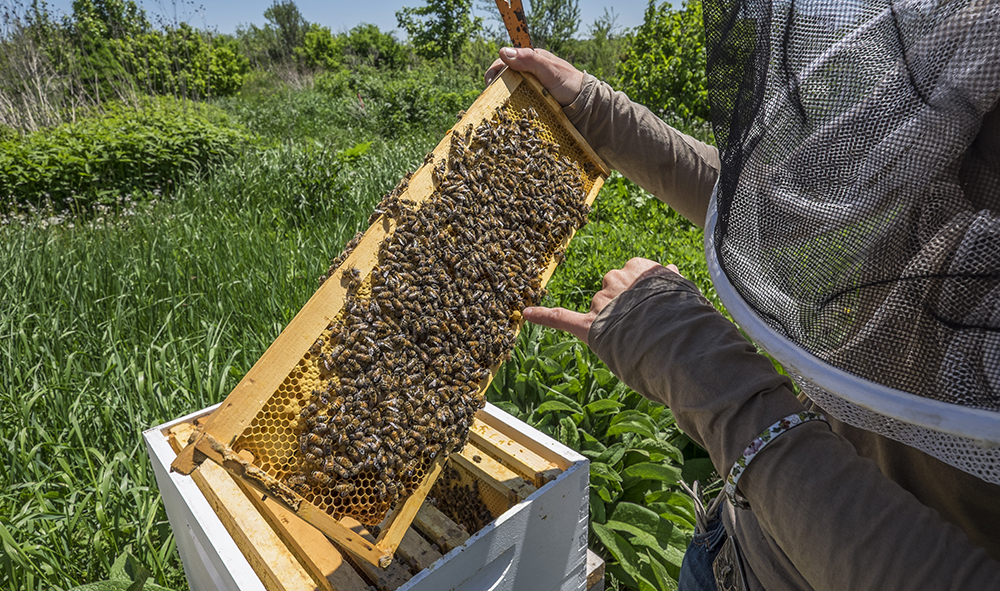Faculty voice: Getting answers about the bees
Meghan Milbrath is an assistant professor in the Department of Entomology and is the coordinator of the Michigan Pollinator Initiative, a program started at MSU to address concerns related to pollinators and pollination, and to work on understanding the threats and solutions for bees in Michigan.
For me, the problems affecting our pollinators are personal. As a kid in Northern Wisconsin, I would help my dad in the bee yard, peering over his shoulder as he worked in the hive, bottling honey or taking off on my bike to follow a swarm. When I left to pursue studies in environmental health sciences I kept beehives as a hobby, an escape from the stress of my doctoral research modeling the risks of diseases and chemicals on human health. My beekeeping hobby, however, was not always a relaxing escape.
Beekeeping had changed considerably since I was a kid. I had learned to keep bees the same way that my dad had learned when he was young — you put the hives out and the bees fend for themselves and make lots of honey that we get to take in the fall. It was very little work and the bees lived from year to year. Now, the bees were making less honey, it was a lot more work and my colonies kept dying.
I joined many local beekeeping clubs to compare notes with other beekeepers, read all the trade journals and followed the online forums, trying to understand what had changed and what it meant. I worked with beekeepers whose families had kept bees for generations and talked to beekeepers who had been honing their craft for decades. I kept hearing the same thing: Beekeeping just isn’t the same. Suddenly, it is much worse.
The parallels between what was happening to bees and some of the things affecting humans were obvious. As I studied emerging diseases in humans for my dissertation, I read about the new pests and pathogens affecting honeybees. I modeled the effect of environmental exposure to persistent pollutants on humans and learned about the complex mixtures of pesticides and other chemicals that bees are exposed to in the nectar and pollen of the plants that make up their food. I included sensitive populations in my models to account for the effects of poor diets and learned about the dramatic loss of the forage plants that feed our bees, which reduces their access to food.
By the time I defended my dissertation I was running a small beekeeping business selling honeybee queens and was fully immersed in the issues facing today’s beekeepers. I decided to apply my skills in risk assessment and disease transmission to honeybees and began work as a postdoctoral research associate in Zachary Huang’s honeybee lab at MSU. There, I studied one of the main emerging diseases affecting honeybees, called nosema ceranae.
I was thrilled to become an academic specialist and work as the coordinator of a new project at MSU: The Michigan Pollinator Initiative, funded by MSU Extension and MSU AgBioResearch. I coordinate and participate in research that can help understand what is happening with pollinators. I work with extension educators and specialists to provide the latest information to beekeepers on how they can better care for their animals and provide information to growers on how they can minimize the risk of their practices for pollinators. I work with other agencies and groups around the state, linking our work at MSU to larger programs, and ensuring that our work is coordinated and efficient.
In 2020 I became an assistant professor in the Department of Entomology, as MSU expanded the pollinator research and extension program. My current work focuses on a variety of risks associated with the health of pollinators, including pesticides, nutrition and diseases.
As the country becomes more focused and interested in the problems facing honeybees and other pollinators, there are a lot of opportunities for MSU to lead the way.
Photos by Kurt Stepnitz.
